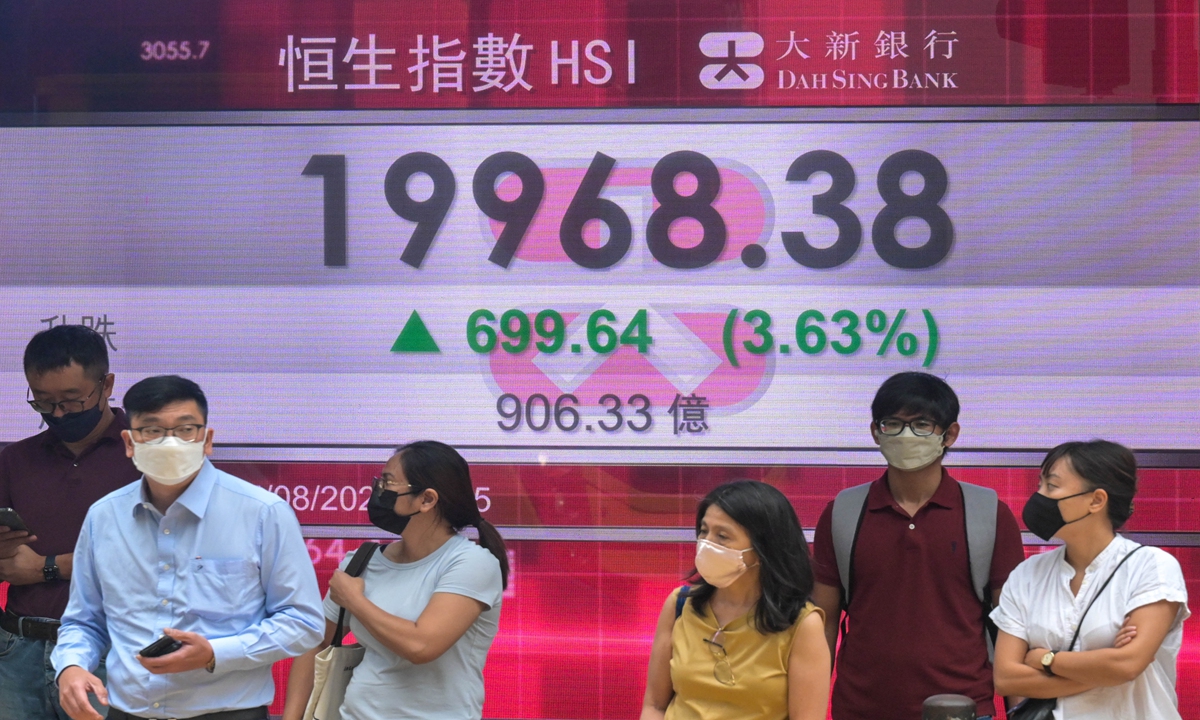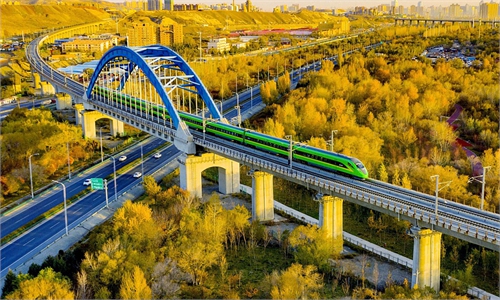Bulls regain footing in wake of China’s pro-growth policy ‘package 2.0’
Nation to open wider to investors despite global headwinds: expert

The benchmark Hang Seng Index soars 3.63 percent to finish at nearly 20,000 points on August 25, 2022, entirely paring back the previous day's 1.2 percent loss. Photo: VCG
Bulls regained footing in the wake of China's pro-growth economic policy "package 2.0," with the benchmark indexes tracking the Chinese mainland and Hong Kong stocks roaring back on Thursday, as the latest policy measures boosted sentiment.
The State Council's Wednesday announcement of 19 follow-up measures, adding to an earlier package of 33 pro-growth policies, was a timely rain nourishing a still-thirsty economy that's wrestling with an array of unprecedented challenges such as heat waves, drought, and the fallout of the Ukraine crisis, experts said.
With the latest package of policies injecting renewed optimism into the market that weighed the impact on the Chinese economy of a conflux of domestic and overseas issues - Huawei founder Ren Zhengfei's recent remarks typified such a predicament - investors bet the economy's continued prosperity will prevail.
Also on Thursday, the Ministry of Commerce gave an official account of the Chinese market's attractiveness for foreign investors, regardless of global sluggishness at large, reaffirming investors' faith in the Chinese economy as a stabilizer to world growth.
The flagship Shanghai Composite Index closed up 0.97 percent at 3,246.25 points on Thursday, led by blue-chip banks, securities, ports and liquor stocks. The Thursday gain reversed a 1.86 percent slump on Wednesday.
At the Hong Kong market, the benchmark Hang Seng Index soared 3.63 percent to finish at nearly 20,000 points on Thursday, entirely paring back the previous day's 1.2 percent loss. The Hang Seng TECH Index surged 6.01 percent on Thursday, buoyed by an across-the-board rise in major internet giants such as Alibaba and Tencent.
The stellar comeback dovetailed the 19 policy measures unveiled on Wednesday. These include allowing for a city-tailored approach to using credit to underpin inelastic housing demand and homeowners eyeing a shift toward bigger space. Among the new measures was the rollout of steps to support the development of privately run businesses and the platform economy.
Capital markets are sensitive to policy changes. Regulation and management have a huge impact on the platform economy, according to Wang Peng, an assistant professor at the Gaoling School of Artificial Intelligence at the Renmin University of China.
The central government's new statement doesn't mean that regulation is being relaxed, but it means that regular and standardized management will be carried out, which is good for the long-term growth of the industry, Wang told the Global Times on Thursday.
The targeted 19 policy measures are supplementary policies to a basket of 33 measures announced in May. The focus of the package will be on promoting infrastructure projects, ensuring energy supply and boosting consumption, Hu Qimu, chief research fellow at the Sinosteel Economic Research Institute, told the Global Times on Thursday.
In addition to previous "remedies" to solve the problems facing China's economy, experts said that the release of the latest package of measures will help boost market confidence by showing that the government's policy toolbox is ample.
Anticipating worldwide economic downturns, Huawei founder Ren Zhengfei stressed "survival" as the main goal, and he warned of an upcoming global recession in an article posted on the Chinese tech giant's internal forum on Monday.
The central government again urged local governments to implement the package of policies to stabilize the economy at an early stage, especially the promotion of infrastructure projects, Tian Yun, former vice director of the Beijing Economic Operation Association, told the Global Times on Thursday.
"The central government hopes to stabilize economic expectations through infrastructure buildup. Now there is huge pressure on the economy as enterprises and residents are cautious about spending money," said Tian.
On top of that, facilitating the entry and exit of business personnel, as part of the policy "package 2.0", is intended to boost foreign investment, market watchers said.
"Now that the US is constantly making small moves, China should actively promote economic and trade exchanges to stabilize foreign investment," said Hu.
China's actual use of foreign investment has continued an uptrend this year as the Chinese market retains appeal for foreign investors, MOFCOM spokesperson Shu Jueting told reporters on Thursday.
The country's complete industrial system, the huge market, the stable society, the economic fundamentals that are turning for the better over the long term, and an ever-opening market are among the main factors, Shu said, that are supporting markets.
In remarks via video to a business forum on Wednesday that marked the 30th anniversary of the establishment of diplomatic relations between China and South Korea, Chinese Premier Li Keqiang stressed that China will only open its door wider to the world, the Xinhua News Agency reported on Thursday.
He said that the country aims to foster a market-oriented, world-class business environment governed by a sound legal framework, and China will always be a fertile land for foreign companies to invest.
China has already made efforts to facilitate economic and trade exchanges. The latest examples are charter flights that carried 163 businessmen from Pakistan and 107 from India to Yiwu, a trade hub in East China's Zhejiang Province.
Another charter flight from South Korea will arrive in Yiwu on Sunday, with the "number of passengers expected to be larger than ever," sources confirmed with the Global Times.

